These fun facts about Greece combine the weird and unusual with the insightful. If you have a vacation planned, these cool things about Greece are fun to read before you go!
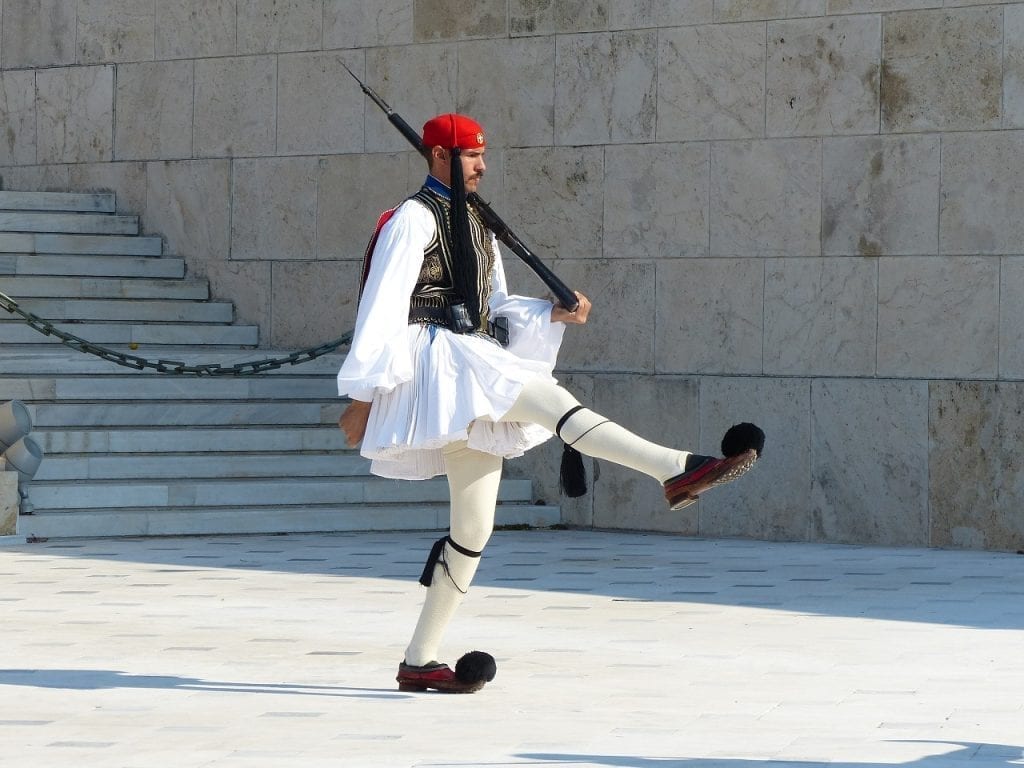
Interesting facts about Greece
Greece is one of the most beautiful, and most visited, countries in the world. From turquoise-colored seas to grand historical monuments and museums, it is a land rich in history and beauty.
You may already know that Greece is the birthplace of democracy, that the Olympic Games started in Greece, and that the ancient Greeks invented and discovered many things in the fields of mathematics, science and philosophy that we take for granted today.
I guarantee though, that there's some interesting Greek facts that you don't know but will truly fascinate you. There's also a few weird facts about Greece that might surprise you!
I've pulled together some Greek trivia facts for you to take a look through. I promise to leave you smiling as well as having learned a little more about Greece!
Greece isn't called Greece
The English speaking world might refer to the country as Greece, but its official name is the Hellenic Republic. Greeks themselves most commonly refer to the name as Hellas (old fashioned term) or Hellada pronounced with a silent ‘H'.
Flag of Greece Facts
The Greek national flag is instantly recognizable thanks to its distinctive blue-and-white pattern. Top left corner of the Greek flag, is a blue square with a white cross symbolizing the Greek Orthodox faith.

There are many traditions and symbolism associated with the Greek flag. Blue is said to represent the sky and sea of Greece, and the white stands for the purity of the struggle for freedom.
The national flag of Greece is rectangular with nine equal stripes, 5 blue and 4 white. The nine stripes are said to represent the nine syllables of the Greek phrase Ελευθερία ή Θάνατος (“Freedom or Death”).
In addition, the nine stripes may also represent the letters of the word “freedom” (Greek: ελευθερία). Individually, the five blue stripes are said to stand for the syllables Ελευθερία. whilst the four white stripes ή Θάνατος.
Greece has 18 UNESCO Sites
If you love ancient historic sites, you'll really want to visit Greece! There are 18 UNESCO sites all over the country, including incredible monuments and landmarks such as the Acropolis, Delphi, Epidaurus and Meteroa.

The Greek Coastline is HUGE!
For such a small country, Greece has a massive coastline, thanks in part to its many islands. The most recent calculations say that Greece has 13,676 kilometres or 8,498 miles of coastline. That would explain why there are so many great beaches in Greece!
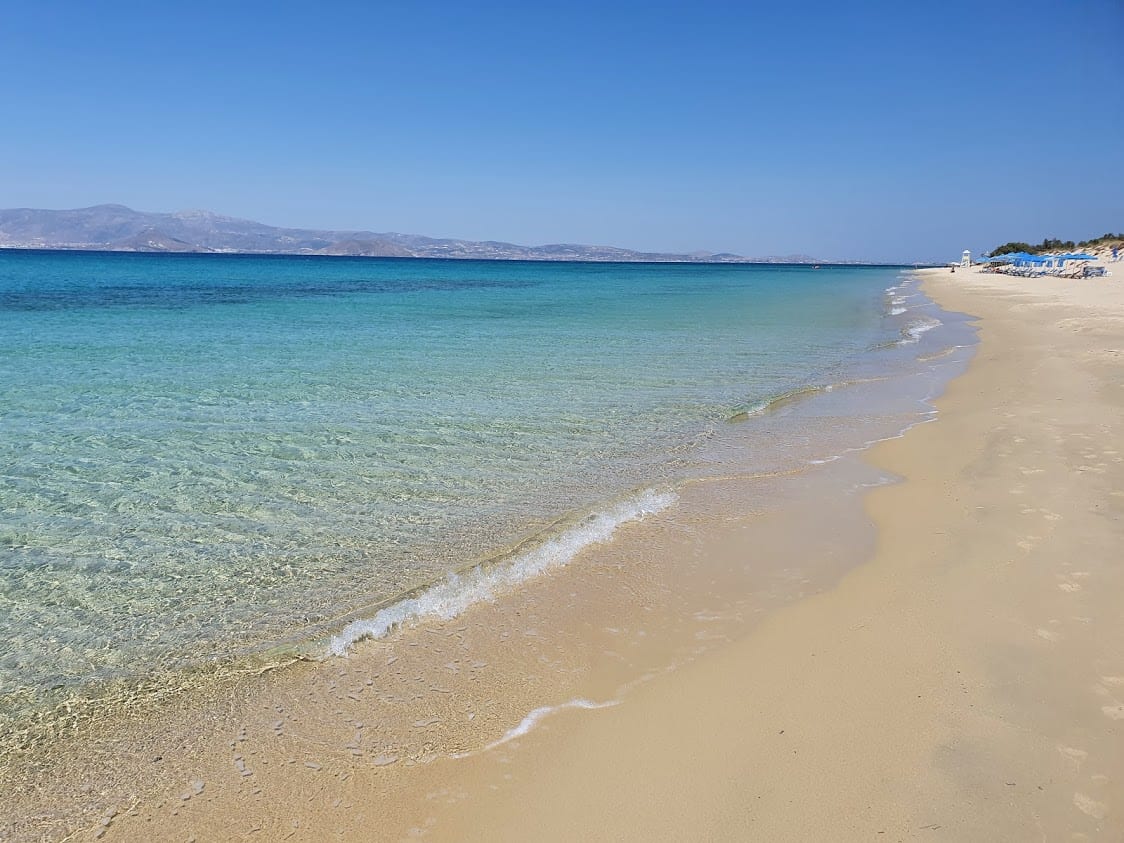
Everyone gets two birthdays in Greece
Most of the traditional Greek names are taken from those of religious saints. Any time the church celebrates a particular saint, anyone who shares the same name will also celebrate what is called his or her ‘Name Day'.
Even someone who has a name that is a derivative, or variation, of the original saint's name will celebrate.
For example, when the saint Constantine is recognized by the church, anyone sharing that name, or a name such as Kostas or Dinos (which are considered variations) will celebrate their Name Day as well.
In fact, Name Days are often more celebrated than actual birthdays.
Note – I'm not actually sure there is a name day in Greece for ‘Dave'. I'm a bit disappointed by that!
Hiding money in a cake is a Greek tradition
Another of the interesting facts about Greece, has to do with New Year. To help ring in the New Year, Greeks celebrate by eating a traditional cake called ‘vasilopita', which is named after Saint Basil.

It just so happens that Saint Basil's Name Day is celebrated on January 1st.
The person preparing the cake adds a coin to the batter before baking. When the cake is ready to be eaten, it is cut into slices, and then served in a certain order, which may vary from family to family.
Generally, additional slices are cut in a symbolic manner for family or friends who couldn't attend the event. The person who finds the coin in their slice of cake is believed to have good luck for the whole coming year.
Greece Is In Pieces
No, I don't mean that Greece is falling to pieces! What I mean is, that Greece is spread out like a jigsaw puzzle waiting to be put together!
Some people may think that Greece is a huge chunk of land surrounded by a handful of islands. Actually, Greece is made up of thousands of islands, each with its own charm.
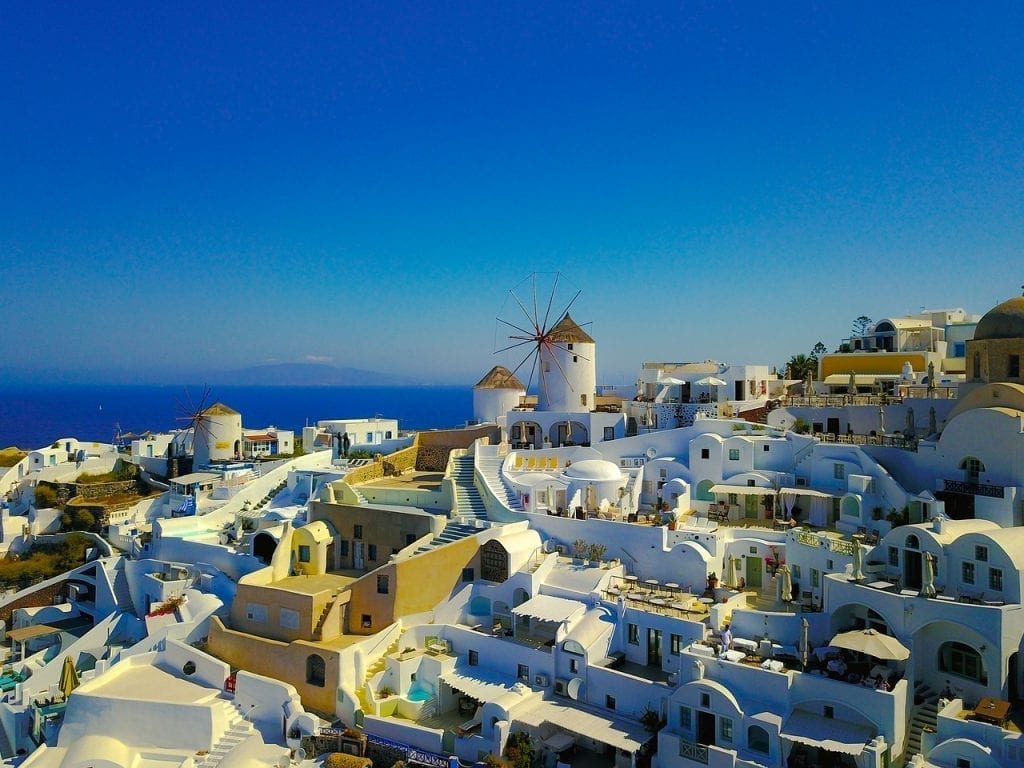
For example, the Ionian Islands are known for their Venetian influence and lush greenery, whereas the Cyclades Islands such as Santorini and Milos are well known for their whitewashed buildings that sport blue doors and shutters.
Crete is the largest of the Greek islands, while Paxos is considered one of the smallest.
The Evil Eye
In Greece, the ‘Evil Eye; is thought to be a curse that can be inflicted by someone staring at them with a harmful or malicious intent.
This curse can be caused by anything for jealousy, to anger, and even envy, and can cause the receiver to suffer from bad luck or even illness.
Special charms, called ‘matohantro' (which is Greek for ‘eye-bead'), are believed to ward off the curse, and can be found hung over baby cribs or even worn as jewellery.

Athletes used to compete naked in the Olympics
Most people know that the first Olympic Games originated in Greece. Perhaps what you didn't realise though, was that athletes competed against each other completely naked!
It gives a different meaning to the word spectator sport, and is one of the weird facts about Greece that always makes me smile!
People live longer in Greece
The Greek island of Ikaria is categorised as one of the world's rare ‘blue zones'. These are places around the world where people live the longest.
A fun fact about Greece is that on Ikaria, over a third of the population lives to be over 90 years of age.
There are many reasons why this may be the case – It could be the relaxed way of life, the Greek diet, or perhaps there's something in the water!
Perhaps we can learn something about living a stress free life from them. Or maybe moving to one of the Greek isles to be sure of a long life!
Greece has one of the healthiest cuisines in the world
One of the reasons that people live long lives on Ikaria, may be to do with the Greek cuisine.
With plenty of olive oil and fresh fruits and vegetables, it is the quintessential Mediterranean cuisine that is often mentioned as being one of the healthiest in the world.

Not all Feta is the same
Feta is the most famous cheese to come from Greece, and it can now be found all over the world. Or can it?
The European Union made Feta a protected designation of origin product in 2002. If you see feta cheese in your supermarket, but it was made in another country, it's not really feta at all!
Plate smashing in Greece
Visitors to Greece may soon become aware that ‘plate smashing' as a means of celebration really isn't a thing any more. So, unless you go to a specific show (dedicated to tourists!), don't expect to see plate smashing in Greece during your vacation.
And don't get carried away and start smashing plates if your team scores a goal at football either – you'll probably be given a broom to clear up the mess and an extra bill to pay!
The ancient Greek statues were actually painted
Another of the cool facts about Greece that people are sometimes unaware of, is that the famous Greek statues were never meant to be plain white!
Instead, they would have been painted in bright colours, which would have brought them to life even more. If you are visiting Athens, and spend some time in the Acropolis Museum, you will see how the statues may have originally looked.
There is a Sacred Triangle in Greece
Most school kids know that the Greek philosopher Pythagoras has a connection with triangles! What is perhaps less well known though, is that there may be a Sacred Triangle of Ancient Greek temples.
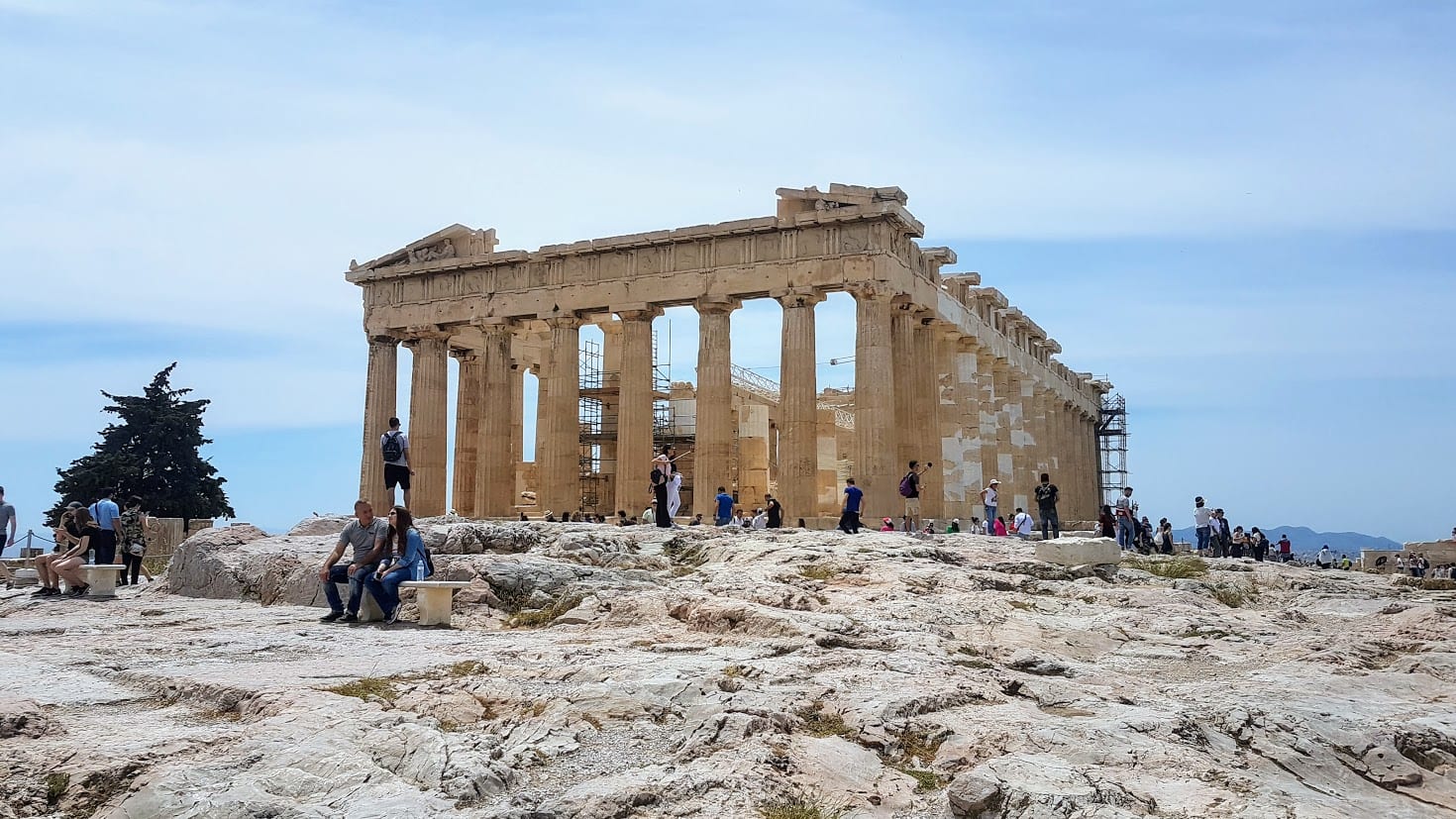
The temples of the Parthenon on the Acropolis, Temple of Posiedon at Sounion, and Temple of Aphaia in Aegina island are said to form an isosceles triangle when looked at on a map. Fact or myth? Take a look on Google maps and form your own conclusion!
The Evzones have to stand perfectly still
The Evzones are an elite group of soldiers that act as guard for the Tomb of the Unknown Soldier in Athens.
Every hour, on the hour, a changing of the guard ceremony takes place in Athens. When the new soldiers move into position, they then have to stand perfectly still for an hour until the next ceremony.
The changing of the guard ceremony is fun to watch for anyone visiting Athens.
Pro tip – If you are in the city on a Sunday, make sure to check it out at 11.00 am. The ceremony at that time is much more elaborate, and includes a marching band! Find out more in my guide of things to do in Athens.
Ancient Greeks were scared of beans
One of the cool facts about ancient Greece, is that people were too scared to eat beans! This is because they believed they might contain the souls of the dead.
Fortunately today, no one believes this, and you can find tasty beans on the menu everywhere. In particular, keep your eye out for ‘giant beans' in restaurants, and definitely try some when on vacation in Greece!
Tourism is really important
One of the fun facts about Greece, is that tourism accounts for 20% of the country’s GDP. This is the highest percentage of any country in Europe, and of any industrialized country anywhere in the world.
There are 179 million olive trees in Greece!
Olives have been cultivated in Greece for thousands of years, and it is the third largest producer of olives in the world.

Olive trees are thought to cover over 20% of the cultivated land in Greece, with the number of trees estimated at 179 million!
This means there are nearly 17 olive trees for every person living in the country. Random facts about Greece don't get much more random than this!
By the way, Kalamata olives may be one of the most well known types in the world, but there are literally hundreds of other varieties of olives in Greece.
The Greeks created Democracy
The Ancient Athenians developed a democracy in the 5th century BC. Although only male Greeks were allowed to vote, they could vote on laws and decisions.
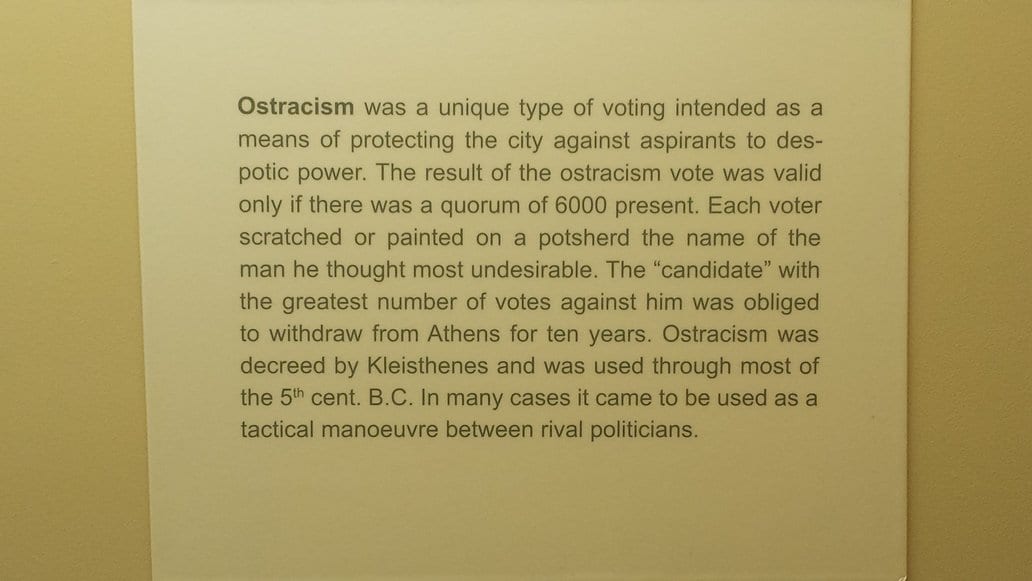
One of the weird facts about ancient Greece, was they also had a system where they could vote to Ostracise someone from the community if they felt that person deserved it!
It should also go without saying that the English word Democracy derives from Greek.
Greece has hundreds of Archaeological Museums
Dig down a few metres almost anywhere in Greece, and you will stumble upon the remains of ancient civilizations! Over the course of many years, hundreds of archaeological sites have been discovered in Greece, and museums built alongside them.

My personal favourite archaeological museums in Greece, are the National Archaeological Museum in Athens, and the Delphi Museum.
The Marathon was invented in Greece
According to Greek history, a soldier called Pheidippides ran a distance of nearly 25 miles from a battlefield near the town of Marathon, Greece, to Athens in 490 B.C. He was delivering news of the defeat of the Persians to the Athenians, and collapsed and died straight afterwards.
Perhaps it wasn't surprising, as during the days leading up to this event, he had run over 300 miles as a messenger between Sparta and Athens! Below, you can see a photo of people enjoying running the Modern Marathon in Athens at a much more relaxed pace!

The Greek myth of how Athens was named
According to Greek mythology, the city of Athens was named after the Goddess Athena when she won a competition with the God Poseidon as to who should be the cities patron.
The two deities presented the occupants of the city with a present. Poseidon offered a spring of water, but it tasted of salt. Athena offered an olive tree which the city residents appreciated a whole lot more. Therefore, the city was named Athena.
The oldest written language in Europe still in use
One interesting piece of Greece trivia, is that Greek is that Greek is the oldest written language still in use in Europe. According to some, perhaps even the world.
The Greek alphabet has been in use since around 1450 BC. Mycenaean Greek tablets have been found at the site of Knossos in Crete dating from this period.
Fun facts about Athens
- Athens is one of the oldest continuously inhabited cities in the world, with people living there for at least the last 7000 years.
- One of the Greek mythology fun facts about Athens, is that Athena and Poseidon competed to see who would be the patron of the city. The Goddess Athena eventually won, and so the city was named after her.
- Athens was the birthplace of democracy, which started around 500 BC.
- The largest city in Greece is Athens.
- More here – Interesting facts about Athens.
Greek language facts
- The modern word ‘alphabet' is actually derived from the first two letter of the Greek alphabet: ‘alpha' and ‘beta'.
- The Greek version of the alphabet is dated back to over 2,500 years ago, and consists of 24 letters. Seven of those letters are vowels.
- English words are typically dominated by consonants, with a sprinkling of vowels, whereas Greek language words are heavily reliant on vowels.
- The Greek language is the world's oldest recorded living language.
General Facts All About Greece
These are some more general facts on Greece that may give you an insight into how the country compares with others in Europe and the world.
-
- Greek Population: As of Sunday, May 17, 2020, the total population of Greece was 10,429,023, based on Worldometer elaboration of the latest United Nations data.
- Landmass: 131,957 km²
- Tallest Mountain: Mount Olympus (2918 metres above sea level)
- Largest Natural Lake: Lake Trichonida (98.6 square kilometres)
- Currency: Euro (see Money in Greece). Before changing it was the Drachma.
- Capital: Athens
- Timezone: (GMT+3)
- Official Language: Greek
Biggest Cities in Greece
The capital city of Greece is Athens, and has by far the largest population in the country. There are several other important cities in Greece both on the mainland on the islands.

Here are the 10 biggest cities in Greece (not including suburbs of the central Athens and Thessaloniki areas):
-
- Athens
- Thessaloniki
- Patras
- Larissa
- Heraklion (Crete)
- Volos
- Ioannina
- Trikala
- Agrinio
- Chalcis
Natural Wildlife in Greece
Greece is home to an abundance of land and marine based wildlife. Loggerhead turtles and monk seal are two well known and protected sealife creatures in Greece, and it is also common to see dolphins when sailing.
Amazing Facts About Greece FAQ
Here are some commonly asked questions about Greek culture, history, and ancient times.
What is the highest mountain in Greece?
Mount Olympus is the highest mountain in Greece at 2917 metres. If the name sounds familiar, this is because in Greek Mythology, Mount Olympus was said to be the home of the Olympian Greek Gods.
How many world heritage sites in Greece?
There are currently 18 UNESCO sites in Greece, including the ancient city of Mycenae and the medieval city of Rhodes.
What is a cool fact about Greece?
Greece has been a member of the European Union since 1981. Greek is one of Europe's oldest spoken languages in the world, having been spoken for more than 3,000 years. Greece has 9,000 miles of coastline. The Olympics began in 776 B.C.
What is unique to Greece?
Greece is most recognized for its islands, beaches, and magnificent ancient temples. A nation with a long illustrious history and heritage, where several mathematicians, artists, and philosophers have been born, Greece is known as the Cradle of Western Civilization.
What are 3 interesting facts about Greece?
- Greece is known as being the cradle of Western civilization because of its massive influence on the subjects of philosophy and mathematics among others.
- Greece was the birthplace of the world's first democracy.
- There are 8,498 miles (13,676 kilometres) of coastline in Greece.
What are 5 interesting facts about Ancient Greece?
- Ancient Greece was not in fact a country with defined borders. Instead, it was a collection of city-states who governed themselves, forming alliances against one another, and uniting when external attackers such as the Persians threatened to attack.
- The Yo-Yo may have been invented by ancient Greek people! A Greek vase dating from 440BC shows a boy playing with a wooden spool and string.
- The Ancient Greeks believed in 12 main Greek Gods and Goddesses known as the Olympian Gods. There were literally thousands of additional minor deities.
- Slavery was so common place in Ancient Greece, that it is estimated that up to 80% of the population of ancient Athens were slaves.
- The Greek city-states were often fighting one another, but had a period of truce before the Olympic Games so that athletes could travel safely to the games.
Where does the phrase it's all Greek to me come from?
Shakespeare used the phrase first in Julius Caesar. Casca says of a speech by Seneca – ‘For mine own part, it was Greek to me.'
Pin these Greece Fun Facts
Please pin the image below and share these interesting Greece facts with anyone you think might like them! If you've got any more funny facts about Greece you'd like to share with us, leave them in the comment section at the end.

Related Articles about Greece
- Basic Greek Words To Learn For Your Vacation in Greece
- The Best Neighborhoods in Athens for Urban Explorers
- Things to do in Peloponnese Greece
- Interesting facts about Santorini
- Santorini Itinerary 3 days
- What is Athens famous for
 – Dave Briggs
– Dave Briggs
Dave is a travel writer who's been living in Athens, Greece since 2015. In addition to putting together these fun facts about Greece, he's created hundreds of other travel blog posts about Greece and the Greek isles which you can find here on Dave's Travel Pages.
Follow Dave on social media for travel inspiration from Greece and beyond: